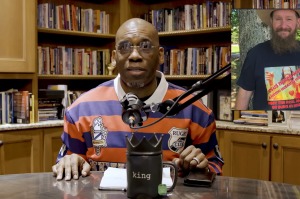Nobel Prize winner says faith is necessary for science

It’d be hard to find a thinker as accomplished as Dr. Vernon Smith. Dr. Smith teaches economics at Chapman University, but that doesn’t even begin to capture his intellectual career; he’s written an entire shelf of books. He is widely considered the founder of experimental economics, for which he was awarded the Nobel Memorial prize in Economic Sciences. He’s a polymath, knowledgeable in everything from quantum physics, to neurobiology, to theology.
I recently talked with Dr. Smith on the podcast Meeting of Minds to discuss his book, The Evidence of Things Not Seen, which is based on a lecture he gave at the Acton Institute. Here are a few highlights from that portion of the discussion, lightly edited for clarity and length:
Jerry: There’s a paradox in the idea that physical science likes to use laws even though those laws are not themselves physical. They are ideas. You can’t eat the quadratic equation. You might be able to use it to triangulate something, but it’s an idea. It’s not material, and yet the material world follows it.
Vernon: Yes. One of my interests in economics has been the contributions of Adam Smith. Smith, of course, is very well known for The Wealth of Nations but much less well known for The Theory of Moral Sentiments. And The Theory of Moral Sentiments is really a model of the order we find in our communities of families, extended families, friends, and neighbors.
Smith observes a huge amount of order in our day-to-day relationships. And he asks, “where does this come from” and “what's the basis for this?” Smith clearly saw the origin of all order as God, what he calls “the great author of nature.” He's got many different words that he uses, including God. He saw that these things, this order, come from our religious beliefs, but that this doesn’t really explain them. Because the question is: how do humans become aware of this order? How do humans learn to follow rules that produce order? That was his challenge, and he didn’t see religion as providing an explanation of that, just as the source of morality and beliefs that become reality through our experience. Although he believed in God, and saw that as the source of all order, there’s still this job we have to do, to ask how human learn rules on the ground, and experientially that, if followed ideally, help to implement faith and religious belief?
And in economics: there’s a huge amount of ordering the economy and it has this capacity to create wealth quite unintentionally. Each person out there, trying to do best for himself, turns out, under the right rules, does what’s best for everybody. That's what showed up in my first market experiments. When I started doing experiments, they were market experiments, and I was astounded.
Jerry: At how quickly people reached equilibrium.
Vernon: Yes. How naïve undergraduates find equilibrium in these markets within a few iterations. And no one who went to graduate school with me in the middle of the 20th century would have believed that would be possible.
Jerry: Everyone taught that you only had equilibrium when you had perfect knowledge.
Vernon: Yeah, people had to have perfect and complete information, you had to have a large number of buyers and sellers. Everybody has to be tiny relative to the total. Turns out all of that stuff is irrelevant. Give me eight or 10 undergraduates. I motivate some of them as buyers and give them values, and they make money by buying low. I give the sellers costs and they make money by selling high. And then we give them rules for trading, rules like in the commodity market auctions, double auctions. When I start the experiment, none of them hear anything about double auctions. But guess what? They pick it up very quickly. They get it. They get right into it and pretty soon they find the equilibrium.
Jerry: It’s almost like we're designed to barter and truck, as your namesake said.
It’s fascinating reading your work or listening to your lectures. You're very epistemological for an economist. There’s a lot of discussion about theory of knowledge, and if I'm seeing a commonality here it’s that the insistence on perfect knowledge is a fatal conceit, and we are able to know more than the theories suggest we are able to know, which to me suggests that we are built and designed to know.
Vernon: Yes, I quite agree. I was sort of pushed into these theory-of-knowledge questions because I had all these results in the lab and, and people were questioning them. I would explain that I’ve discovered this incredible way to learn, but I had to justify my existence, so I was pushed into these kinds of questions.
Listen to the full interview this article is based on here.
Jerry Bowyer is financial economist, president of Bowyer Research, and author of “The Maker Versus the Takers: What Jesus Really Said About Social Justice and Economics.”



























